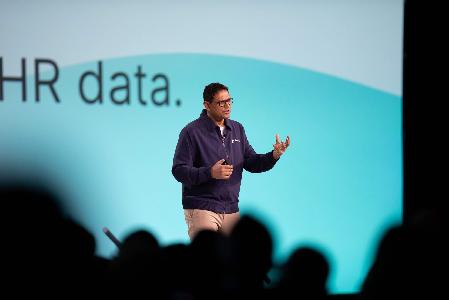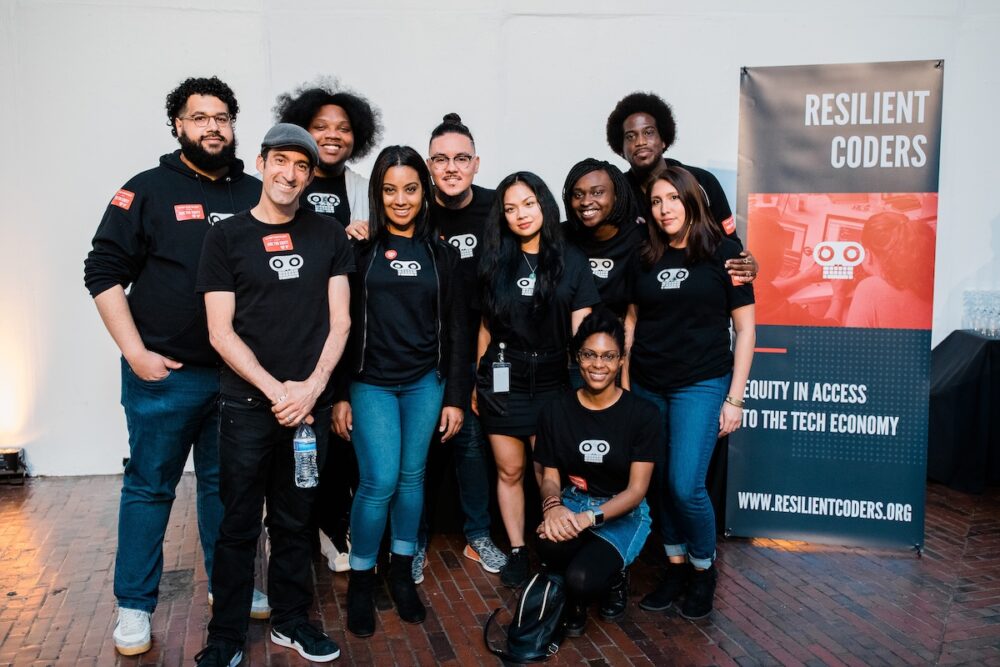
This editorial article is a part of DEI Progress Month of Technical.ly’s editorial calendar.
Resilient Coders is a Cambridge, Massachusetts-headquartered coding bootcamp with the goal of getting more Black and brown people into the tech field. The 20-week-long, virtual bootcamp aims to prioritize equity throughout its programming: Not only are courses free, it also pays participants a $1,000 biweekly stipend for their involvement. There’s a chapter in Boston and in Philadelphia, and in the summer of 2021, the program expanded in Pittsburgh, joining the ranks of a handful of other locally focused bootcamps.
At the time, the goal was to launch a local pilot cohort of 12 students with support from the Richard King Mellon Foundation, which contributed a $100,000 grant,
“Pittsburgh had not really been on my radar until they reached out,” founder and former Executive Director David Delmar Sentíes told Technical.ly at the time, about the foundation. “They essentially afforded us the opportunity to have an exploratory process, and so that meant that we were able to apply a certain degree of resources to just getting to know Pittsburgh and its people. And, I mean, I was just blown away.”
Yet despite the hope that the success seen in other cities could be replicated in Pittsburgh, the Steel City’s chapter quietly shut down in 2022.
Ayanna Lott-Pollard, Resilient Coders’ former chief of staff who took over as executive director in November, told Technical.ly earlier this year that when the program was brought to the city, it received lots of support. That came in the form of financial investments, yes, but also community partnerships from organizations such as Wilkinsburg-based business resource center Community Forge. Additionally, there were individuals interested in participating in the program, though recruiting was still a challenge.
The problem came, per Lott-Pollard, when Resilient Coders participants graduated: Pittsburgh companies wouldn’t hire them.
“We had about 30 students go through the program, and the students who were hired were hired to work for organizations for companies outside of Pittsburgh,” or for remote companies based outside the city, she said.

Ayanna Lott-Pollard. (Courtesy photo)
This was an unprecedented turn of events for the program, according to Lott-Pollard. During the time Resilient Coders came to Pittsburgh, she said, the program was successful in the other cities where it’s currently still active, Boston and Philly. She believes a part of the problem was a lack of necessary employer connections.
“What we learned from the experience is that we need community partners, those who are going to be willing to hire the students once they complete the program,” Lott-Pollard said. “And we were able to see after doing several cohorts that all of the factors were not working in conjunction to create a successful environment for the students who were involved.”
Financial backer RK Mellon Foundation’s spokesperson, Tim Reeves, told Technical.ly he couldn’t comment on the program’s local shutdown.
Technical.ly has reported on numerous local efforts to diversify the tech workforce, from hands-on apprenticeships at Fortyx80 and Deeplocal to women-in-tech meetup groups to federally funded robotics fellowships. As one of the organization’s community partners, Community Forge Executive Director Michael Skirpan told Technical.ly via email that although the interest in the Resilient Coders program itself was high, the pipeline to jobs in the city was not yet established.
“There were some companies intrigued by Resilient Coders but couldn’t figure out a hiring plan in the timeline needed to make it a success during RC’s 1-year pilot in Pittsburgh where they graduated 2 cohorts,” Skirpan wrote. The organization’s “ultimate decision to pull out of Pittsburgh came before their first full cohort even graduated. They took on a small second cohort and worked for 6 months with us (CF) attempting to find new employment opportunities, but we found ourselves stuck as companies either were no longer interested in ‘untraditional hiring’ or they needed more time to learn about RC and establish a partnership (time we didn’t have).”
Lott-Pollard did not respond to Technical.ly’s request for confirmation of this timeline.
“I would like to see Pittsburgh companies put more time and effort into paying attention to these types of programs that can increase equity in the tech sector.”Michael Skirpan Community Forge
Skirpan said although the organization enjoyed working with Resilient Coders and still thinks highly of the program, the lack of connections, the number of tech company closures Pittsburgh saw in 2022 (i.e. fewer potential employers) and the time constraints created the perfect storm for an unsuccessful pilot. Yet he hopes to see more Pittsburgh companies be willing to partner with programs like Resilient Coders in the future.
“We were ultimately disappointed by the inability to get employers on board, but do recognize there were a series of contextual realities of that time that made it difficult,” Skirpan wrote. “I would like to see Pittsburgh companies put more time and effort into paying attention to these types of programs that can increase equity in the tech sector. We do believe that a longer runway upfront to establish relationships and partnerships with companies may improve outcomes if there are future attempts to do things like RC in the city.”
An added factor, according to Pittsburgh-based RAND Corporation economist Melanie Zaber, was that employers in the city tend to care more about degrees as opposed to experience. (In January, RAND published the report “Assessing Pittsburgh’s Science- and Technology-Focused Workforce Ecosystem,” which determined the region needed to invest more in tech diversity initiatives.) When examining the case of Resilient Coders and tech workforce programs like it, Zaber said, RAND researchers found that a part of the problem is that the city of Pittsburgh is “behind the times” when it comes to skills-based hiring.
“Some of the challenges that Resilient Coders and potentially other bootcamps have had with placing graduates is that there may be an over-reliance on degrees in Pittsburgh as a signal of the capability of doing a job,” Zaber said.
“Some of the challenges that Resilient Coders and potentially other bootcamps have had with placing graduates is that there may be an over-reliance on degrees in Pittsburgh as a signal of the capability of doing a job.”Melanie Zaber RAND Corporation
Another piece of the puzzle, the economist said, is how much the org was hoping to see its participants paid. Zaber pointed out that on average, Pittsburgh tech workers in computing fields are paid an average of $52 per hour, which is below the national average of $64 per hour. Yet when Zaber and other RAND Corporation employees spoke with program staff, they found that Resilient Coders were hoping for higher salaries that Pittsburgh employers weren’t willing to pay.
“They were targeting and managed to achieve [higher salaries] for graduates in their Philadelphia cohort, and they were getting employers kind of balking at that in Pittsburgh,” Zaber said. (Lott Pollard told Technical.ly in December that the average salary for job placements in Philadelphia was $92,400.)
She added that companies being more open to experiences and skills that can be acquired later, as opposed to just traditional schooling, could lead to more success with regard to programs like Resilient Coders.
Despite the 2022 shutdown, Lott-Pollard said the door isn’t entirely closed on having a Pittsburgh chapter of Resilient Coders. Since the market has changed over the past year, should companies be willing to partner with Resilient Coders, it’ll revisit operating in the city.
“The market has changed when it comes to the hiring of junior software engineers. We’ve all seen the manifold or the plethora of layoffs across the industry in tech,” Lott-Pollard said. “As things drum up or if we were able to secure partners that were willing to hire students, we would be more than happy to revisit Pittsburgh.”
Atiya Irvin-Mitchell is a 2022-2024 corps member for Report for America, an initiative of The Groundtruth Project that pairs young journalists with local newsrooms. This position is supported by the Heinz Endowments.Join the conversation!
Find news, events, jobs and people who share your interests on Technical.ly's open community Slack

Pittsburgh weekly roundup: 412 Food Rescue's new CEO; Inside Diversitech; Fentanyl sensor innovations

The Affordable Connectivity Program just ended. What’s next for the 763,000 Pennsylvanians who depended on it?

RealLIST Connectors 2024: Meet 20 leaders spreading innovation throughout Pittsburgh



